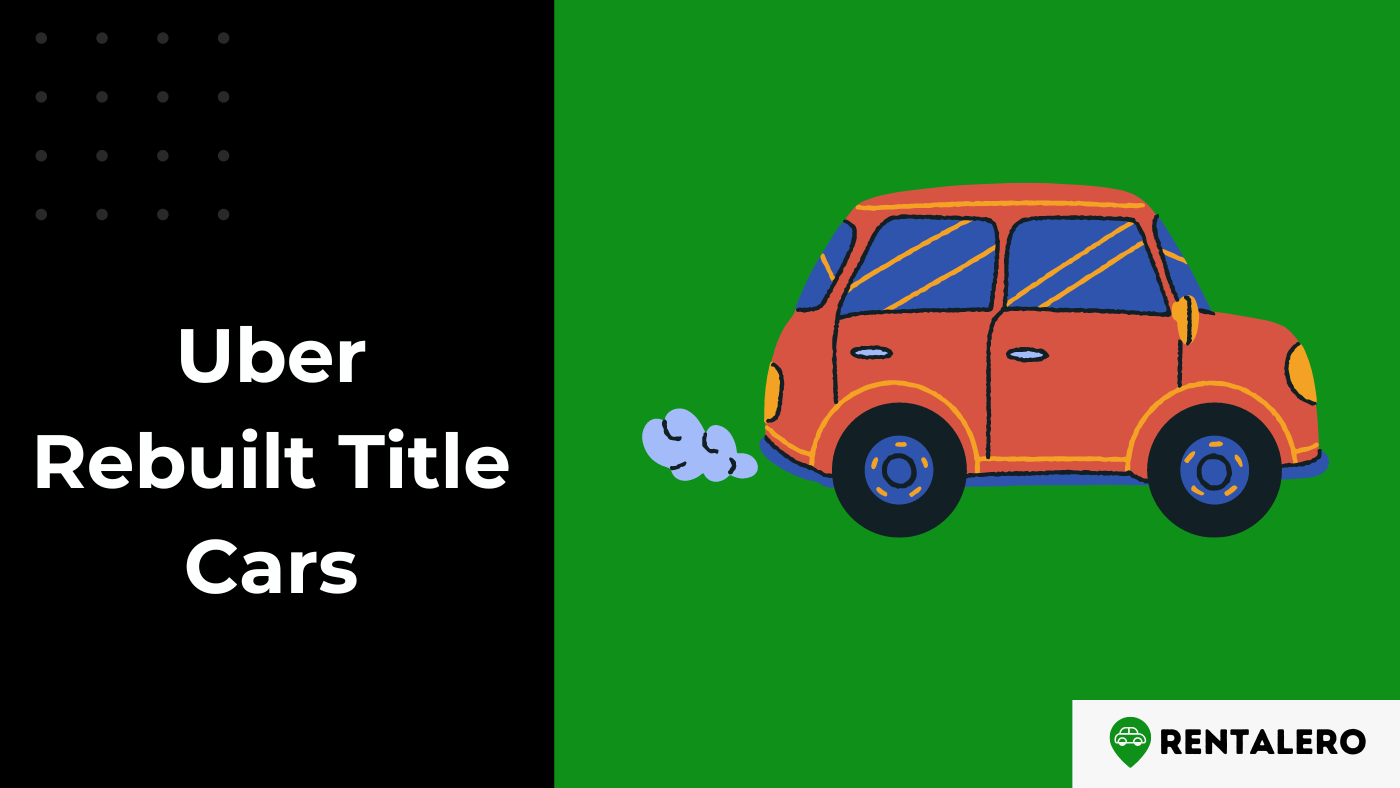Ride-sharing is a buzzword in today’s transportation industry, and Uber sits right at the heart of it. But a topic has been making waves among car owners—Does Uber Accept Rebuilt Title Cars?
In this post, we’ll clear the air. We’ll walk you through the following:
- The official stance of Uber on rebuilt title cars
- The specific vehicle requirements Uber has in place
- Practical tips for drivers with rebuilt title cars
In short, this article offers a comprehensive guide to Uber’s policies regarding rebuilt title cars. Skipping it might leave you in a cloud of uncertainty.
Advertising links are marked with *. We receive a small commission on sales, nothing changes for you.
Key Takeaways
- Uber’s policy on rebuilt title cars is not explicit, but regardless of title, any car must pass a rigorous safety and functionality inspection to be eligible.
- Insurance can be a hurdle for rebuilt title cars, as they’re often deemed higher risk, leading to more expensive premiums or refusal of coverage.
- Local laws and regulations can influence Uber’s acceptance of rebuilt title cars, so it’s vital to check with local Uber support or a legal expert.
- Factors like vehicle safety, passenger comfort, and insurance implications significantly influence Uber’s acceptance of rebuilt title cars.
- Aiming for a thorough vehicle inspection, securing proper insurance, and being prepared for higher costs are practical steps for drivers with rebuilt title cars seeking to drive for Uber.
Understanding Vehicle Titles
A vehicle title is a legal form that establishes a person or business as the legal owner of a vehicle. There are different types of vehicle titles, and the classification depends on the car’s history. Three common types of titles are regular, salvage, and rebuilt.
Regular Title
A regular title, also known as a clean title, is issued to vehicles that have not experienced significant damage or alteration. It signifies the vehicle is in good condition and safe on the road.
Salvage Title
A vehicle gets a salvage title when it has sustained major damage, typically due to an accident, flood, or other catastrophic event.
When the vehicle’s repair cost exceeds its market value before the damage, insurance companies often label it ‘totaled’ and issue a salvage title.
Rebuilt Title
A rebuilt title is assigned to a vehicle that previously held a salvage title but has since been repaired and passed certain state-mandated inspections.
Although these cars are deemed roadworthy, they bear a permanent record of their past damage.
It’s essential to understand these different types of titles when buying a car or planning to use it on a ride-sharing platform like Uber. Each title has unique implications for the vehicle’s value, insurance, and eligibility for services like Uber.
Uber’s Official Stance on Rebuilt Title Cars
According to Uber’s official vehicle requirements, the primary focus is on the car’s condition and safety features. The company requires a 4-door vehicle with independently opening passenger doors, no cosmetic damage, and no commercial branding.
There is no explicit mention of barring rebuilt title cars.
However, the vagueness of the policy does create room for confusion. Some drivers and car owners interpret the policy differently.
Some say that Uber does not permit vehicles with a salvage or rebuilt title, while others suggest that Uber accepts rebuilt title cars.
Even with such conflicting reports, one thing is clear—any vehicle, regardless of its title, must pass Uber’s vehicle inspection to be eligible. The inspection focuses on safety and functionality.
It assesses the vehicle’s key components, including brakes, tires, lights, windows, seatbelts, and the car’s overall cleanliness. So, even if your car has a rebuilt title, it could be eligible for Uber if it passes the inspection.
Also, remember that Uber requires its drivers to have insurance coverage for their vehicles. However, getting insurance for a rebuilt title car can be more challenging and often more expensive than regular vehicles due to their history.
Like many things, the acceptance of rebuilt title cars can also depend on local laws and regulations.
Some regions have stricter rules about the commercial use of rebuilt title vehicles. It’s always advisable to check with local Uber support or a legal expert in your area for the most accurate information.
Factors Influencing Uber’s Acceptance of Rebuilt Title Cars
Diving into the specifics, a few critical factors influence Uber’s acceptance or rejection of rebuilt title cars. These factors often revolve around safety, passenger experience, and insurance implications.
Safety concerns
The ride-sharing giant wants to ensure all its vehicles offer safe transport for riders. This focus on safety is why the company conducts a detailed vehicle inspection.
They look at key components like the brakes, tires, lights, and seat belts. So, for rebuilt title cars, passing this inspection is crucial. If a rebuilt vehicle is in top-notch condition, it might be accepted.
Passenger comfort and experience
Uber wants to maintain a certain standard of service for its riders. A car with visible damage or faults could detract from this standard, potentially leading to lower ratings for the driver.
So, Uber would likely prefer cars in good aesthetic and mechanical condition to provide a comfortable ride.
Insurance implications
Uber drivers need to have insurance coverage for their vehicles. However, insurers often consider rebuilt title cars a higher risk due to their damage history.
They might charge higher premiums or even refuse coverage. This added difficulty in securing insurance could make it harder for a driver with a rebuilt title car to meet Uber’s requirements.
These factors together influence Uber’s decision-making process.
They highlight the issue’s complexity and why the answer to “Does Uber accept rebuilt title cars?” isn’t a simple ‘yes’ or ‘no.’ It’s always wise for drivers to contact their local Uber support or a professional expert to understand their situation better.
The Vehicle Inspection and Insurance Process
Uber’s inspection primarily focuses on safety features. They assess the brakes for effective functioning and the tires for the sufficient tread. The inspection also covers all lighting systems, including headlights, taillights, and turn signals.
Seat belts are scrutinized to ensure they latch correctly, and windows must open and close properly.
Moreover, Uber checks the vehicle’s general cleanliness and aesthetic condition. Dents, large scratches, or missing components may cause a vehicle to fail the inspection.
However, passing this inspection could clear the path toward acceptance for rebuilt title cars that have been restored adequately.
Moving on to insurance, Uber requires all drivers to carry insurance for their vehicles. This requirement can pose a challenge for drivers with rebuilt title cars.
Insurance companies often view these vehicles as higher-risk, leading to more expensive premiums or, in some cases, refusal of coverage.
To drive for Uber, drivers must provide proof of insurance in their name. This insurance must meet or exceed the local legal requirements. If a driver leases or rents their vehicle, their name must be listed on the insurance for that vehicle.
It’s important to note that personal auto insurance usually doesn’t cover activities related to ride-sharing. Uber provides its insurance policy to fill this gap. When the Uber app is active, the driver is covered by Uber’s insurance.
However, Uber’s coverage level varies depending on the driver’s status during an incident. If an accident occurs while waiting for a ride request, the driver’s insurance is the primary coverage. If Uber’s insurance comes into play, it is subject to higher deductibles.
Uber provides additional liability coverage, from accepting a ride request to dropping off a passenger. This coverage only applies if the driver’s insurance doesn’t cover the full amount.
Conclusion
In wrapping up, it’s fair to say, “Does Uber accept rebuilt title cars?” isn’t straightforward. While Uber’s official rules don’t clearly state a ban on such vehicles, it’s far from a green light.
The real deal-breakers are safety, comfort, and insurance. You’ve got to pass Uber’s detailed inspection and secure insurance coverage, which can be tricky for rebuilt title cars.
Remember, laws can differ by location, making the situation more complex. Always seek guidance from Uber’s local support or legal experts in your area. Also, consider the potentially high costs of insuring a rebuilt title car.
So, is driving for Uber with a rebuilt title car worth it?
That’s a personal decision based on the factors we’ve discussed. Be informed, be prepared, and then make your move.
Frequently Asked Questions
What is a rebuilt title car?
A rebuilt title car previously had a salvage title due to significant damage but has since been repaired and passed certain state-mandated inspections. Although deemed roadworthy, these cars carry a record of their past damage.
Does Uber explicitly state its policy on rebuilt title cars?
Uber does not explicitly state its policy on rebuilt title cars. The main focus is on the condition and safety features of the vehicle. However, all cars must pass Uber’s detailed inspection, which focuses on safety and functionality.
What is the vehicle inspection process for Uber?
Uber’s inspection assesses key safety components such as brakes, tires, lights, windows, seat belts, and overall cleanliness. Any visible damage or defects may fail the inspection. Rebuilt title cars can qualify if they pass this rigorous assessment.
What are the insurance requirements for driving with Uber?
Uber requires all drivers to carry insurance for their vehicles. This insurance must meet or exceed local legal requirements.
If a driver leases or rents their vehicle, their name must be listed on the insurance for that vehicle. Getting insurance for a rebuilt title car might be more difficult and expensive.
Are there any tips for drivers with rebuilt title cars who wish to drive for Uber?
Yes, there are a few practical tips. These include getting a thorough inspection of your car, securing the proper insurance, preparing for potentially higher costs, and reaching out to Uber or a legal expert for specific advice tailored to your situation.

Nzoputa has been writing for Rentalero since day one and is one of our most experienced members when it comes to the rental industry. For her, nothing beats Uber!
Advertising links are marked with *. We receive a small commission on sales, nothing changes for you.

